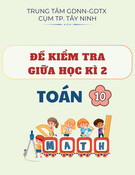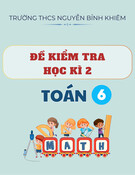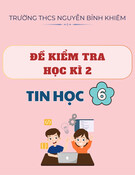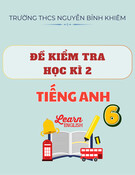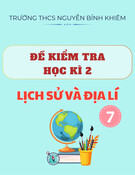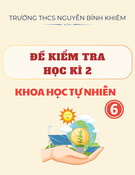
Đ KI M TRA CH T L NG H C KỲ II Ề Ể Ấ ƯỢ Ọ
Môn: TI NG ANH 10Ế
I. Choose the word whose underlined part is pronounced differently from that of the rest.
Câu 2: A. organized B. happened C. filled D. photographed
A. investigate B. contribute C. tiny D. different
A. potatoes B. mangoes C. filled D. photographed
A. investigate B. contribute C. tiny D. different
II. Ch n ph ng án đúng A ho c B, C, D đ hoàn thành các câu sau đây.ọ ươ ặ ể
People all over the country were ......................by the news of the victory.
A. excited B. interesting C. fantastic D. exciting
1. She took a bus _________be late for work.
A. in order to not B. to not C. so as not to D. A & C
. The man would have completed all his work if his wife ______ him the dinner.
A. phones B. hadn’t phoned C. phoned D. didn’t phone
The fire has caused a considerable damage.
A. A considerable damage has been caused by the fire.
B. A considerable damage has caused the fire.
C. A considerable damage been has caused the fire.
D. A considerable damage had caused by the fire.
Which do you prefer, jazz ________ pop music?
A. to B. and C. with D. or
III. Ch n ph ng án đúng A ho c B, C, D ng v i t ho c c m t c n ph i s a đ các câu sau tr thành câuọ ươ ặ ứ ớ ừ ặ ụ ừ ầ ả ử ể ở
đúng.
Câu 31: To live healthily (A) we should do (B) exercises regularly(C) and stop smoke (D).
Câu 32: Last Sunday I stayed (A) at (B) home to make (C) my homework (D).
Câu 33: People (A) are asked not cut (B) a lot of trees (C) for firewood (D).
Câu 34: This is (A) the first (B) time I eat (C) honey with (D) spaghetti.
Câu 35: Music (A) is clear (B) different from (C) language (D).
IV. Ch n ph ng án A ho c B, C, D ng v i câu có nghĩa g n nh t v i m i câu cho s n d i đâọ ươ ặ ứ ớ ầ ấ ớ ỗ ẵ ướ y.
Câu 36: It took me the whole day to tour around the city.
A. I spent the whole day tour around the city. B. I spent the whole day with touring around the city.
C. I spent the whole day in touring around the city. D. I spent the whole day touring around the city.
Câu 37: This is the girl. I saw her at school yesterday.
A. This is the girl who I saw at school yesterday. B. This is the girl about who I saw at school yesterday.
C. This is the girl on whom I saw at school yesterday. D. This is the girl of who I saw at school yesterday.
Câu 38: Jane missed the bus. She went to school late.
A. Jane went to school late and she missed the bus. B. Jane went to school late though she missed the bus.
C. Jane went to school late because she missed the bus. D. Jane went to school late but she missed the bus.
Câu 39: This movie is not as interesting as the one I saw yesterday.
A. The movie I saw yesterday is as interesting as this one.
B. The movie I saw yesterday is more interesting than this one.
C. The movie I saw yesterday is not so interesting as this one.
D. The movie I saw yesterday is interesting than this one.
Câu 40: I can’t put on these shoes. They are too small for me.
A. My feet are not big enough for these shoes. B. These shoes are not big enough for my feet.
C. These shoes are too small enough for my feet. D. My feet are too small to get in these shoes.
V. Read the passage, and then answer the questions.
For many young people in Britain, sport is a popular part of school life, and being in one of
the school teams and playing in matches is very important. If someone is in a team, it means a
lot of extra practice and often spending a Saturday or Sunday away from home, as many
matches are played then.
Trang 1/2 - Mã đ thi 136ề

It can also involve travelling to other towns to play against other school teams and then
staying on after the match for a meal or a drink. Sometimes parents, friends and other
students will travel with the team to support their own side.
When a school team wins a match, it is the whole school that feels proud, not only the
players. It can also mean that the school becomes well-known for being good at certain sports,
and students from that school may end up playing for national and international teams so that
the school has some really famous names associated with it!
1. Are matches often played on Saturdays or Sundays?
……………………………………………………………………………………………………………
2. Why does a sport team have to travel to other towns?
…………………………………………………………………………………………………………
3. Who will sometimes travel with the team?
……………………………………………………………………………………………………………
4. Who feels proud when a school team wins?
……………………………………………………………………………………………………………
VI. Đ c k đo n văn sau và ch n ph ng án đúng A ho c B, C, D cho m i ch tr ngọ ỹ ạ ọ ươ ặ ỗ ỗ ố .
Louis Braille was born in 1809 ...(46)... Coupvray. He was a French ...(47)... of the blind. He himself was blind
from the age of three, and in 1818 he went to the National Institute ...(48)... the Young Blind in Paris. Soon showing
marked ...(49)... in both science and music, he became famous in Paris as an organist and violoncellist. In 1826 Braille
began teaching the blind in the institue. Braille is known for his idea of modifying the Barbier “pointing writing”
system, used for coded army messages, to enable the blind to read. Pointing writing ...(50)... of embossed dots and dashes on
cardboard; the braille system derived from it is used successfully today, in slightly modified form, and in many countries.
Câu 46: A. on B. in C. at D. of
Câu 47: A. lawyer B. teacher C. doctor D. designer
Câu 48: A. for B. to C. with D. of
Câu 49: A. intelligence B. ability C. activity D. determination
Câu 50: A. consists B. contains C. combines D. comprises
--- THE END ---
Trang 2/2 - Mã đ thi 136ề

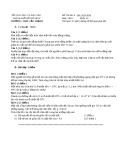
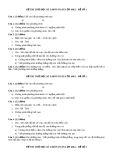
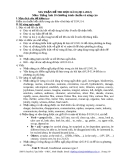
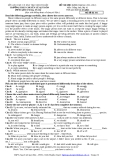
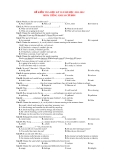
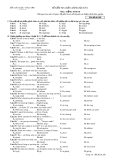
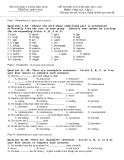
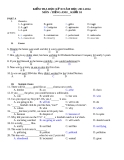
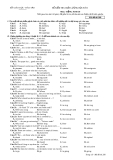
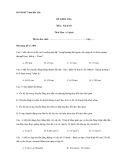

![Đề thi Tiếng Anh có đáp án [kèm lời giải chi tiết]](https://cdn.tailieu.vn/images/document/thumbnail/2025/20250810/duykpmg/135x160/64731754886819.jpg)
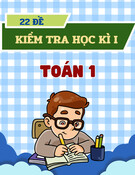
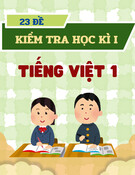

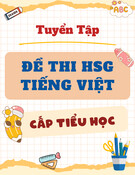
![Đề thi học kì 2 Vật lý lớp 11: Đề minh họa [Mới nhất]](https://cdn.tailieu.vn/images/document/thumbnail/2025/20250709/linhnhil/135x160/711752026408.jpg)
